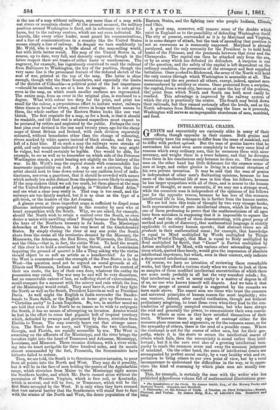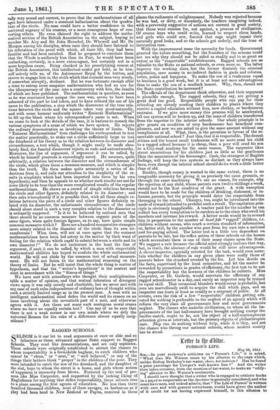INTELLECTUAL CRAZES.
GENIUS and eccentricity are curiously alike in many of their effects/ though opposite in their causes. Both genius and eccentricity have the courage to differ from the mass of mankind, and to differ with perfect aplomb. But the man of genius knows that he surrenders his mind even more completely to the very same kind of reasons which sway ordinary men, that he measures them with nicer
i accuracy, and weighs them in a truer balance, and that he diverges from them in his conclusions only because he does so. The eccentric man on the other hand has little deference for the common sense of men at large, and rather glories in living in a rational structure of his own private invention. It may be said that the man of genius is independent of other men's fluctuating opinions, because he has more of the intellectual life of man in him than his fellows, because he has larger sympathies with all of them, and is nearer to the human centre of thought, or more encentric, if we may use a strange word, while the eccentric man is independent of the opinions of his fellows just for the opposite reason, because he has less of this common intellectual life in him because he is farther from the human centre.
We are led into this train of thought by two very strange books, both representatives of pure intellectual crazes, which lie before us, one of them professing to prove that the mathematicians of all ages have been mistaken in supposing that it is impossible to square the circle ;* and the otherf of them demonstrating, with great pomp of method and pride of discovery, that mathematical language is strictly applicable to ordinary human speech; that abstract terms are all products in their mathematical sense : for example, that knowledge is equal to Mind multiplied byWords multiplied by Things (Mind x Wordx Things), that Man is equal to Body multiplied by Soul multiplied by Spirit, that " Cause" is Parties multiplied by Action multiplied by Mind, with various other astounding proposi- tions which, quoted thus barely, would give the impression of absolute intellectual impotence, but which, seen in their context, only indicate a deep-seated intellectual craze.
Of course, we have no intention of reviewing these remarkable works, but they afford a curious study when we come to look at them as samples of those modified intellectual eccentricities of which there are some seeds probably in all but the very soundest minds ; for, i
that intellectual as well as moral sanity is a matter of degree in all of us, no one who knows himself will dispute. And we take it that the true gauge of mental sanity is suggested by the remarks we have made above. The sanest men are those who trust the common and universal principles of human reason the most implicitly; who can venture, indeed, after careful verification, though not without preliminary misgiving, to trust them even when they lead to the con- tradiction of generally accepted conclusions, but who have always the wish and generally the power, to communicate their own convic- tions to others as soon as they have satisfied themselves of their truth. Wherever there is any sign of contempt either for the common-place reasons and arguments, or for the common sense, or for the sympathy of others, there is the seed of a possible craze. Where the contempt is not for the reason of other men, but for their sym- pathy, where it is the desire to secure the intellectual assent of others which fails, then the eccentricity is moral rather than intel- lectual; but it is the sure root also of a growing intellectual inca- pacity to reach the common sense and sway the common judgment of mankind. On the other hand, the mass of intellectual crazes are accompanied by perfect moral sanity, by a very healthy wish and ex- pectation to bring others to our own point of view, but by a total incompetence to understand the difficulties in the way, or to appre- ciate the kind of reasoning by which plain men are usually con- vinced.
This, for example, is certainly the case with the writer who has published a handsome volume full of mathematical illustrations gene- . The Quadrature of the Circle. By James Smith, Esq., of the Mersey Docks and Harbour Board. Simpkin and Marshall. t Philosophy; or, the Science of Truth. A Treatise on First Principles—Mental, Physical, and Verbal. By James Haig, EA., of Lincoln's Inn. Saunders and Otley. rally very sound and correct, to prove that the mathematicians of all ages have laboured under a constant hallucination about the q.uadra- ture of the circle. No man could have a better confidence in the universal cogency of his reasons, or a more courageous hope of con- verting others. He even claimed the right to address the mathe- matical section of the British Association on the subject, hoping to number Mr. Airy and Sir John Herschel, Dr. Whewell and Mr. De Morgan among his disciples, when once they should have listened to his refutation of the proof with which, all their life, they had been familiar and had been satisfied. Had he proposed to convince them that the Whole is uniformly less than its Part, he would have been embarking, certainly, in a more extravagant, but certainly not in a more hopeless cause. Being checked in his proselytizing course at the British Association, this intellectual zealot got hold, as he him- self naively tells us, of the Astronomer Royal by the button, and strove to engage him in the strife which that eminent man very wisely, if somewhat abruptly, declined. But he was fortunate enough after a time to entrap some sanguine mathematician who had no eye for the idiosyncrasy of the case into a controversy with him, the results of which are here published. The mathematician in question, as soon as he was convinced how unique the case was, seems to have been ashamed of the part he had taken, and to have refused the use of his name to the publication, a step which the discoverer of the true rela- tions between the circle and the square takes very good-naturedly, and with some humour uniformly writes "Eminent Mathematician" to fill up the blank where his correspondent's name is not. When we come to look at the details of the case, it is curious to remark the various symptoms of a craze of which we have spoken. He rejects the ordinary demonstration as involving the theory of limits. The "Eminent Mathematician" then challenges his correspondent to test the matter practically, to stake out a circle sufficiently large to test the falsehood of his theory as to the relation between its diameter and circumference, a test which, though it might easily be made abso- lutely final, the fancied discoverer rejects as rude and untrustworthy. Moreover, the line of argument, if argument it can he called, by which- he himself proceeds is exceedingly novel. He assumes, quite arbitrarily, a relation between the diameter and the circumference of the circle, which gives them a common measure, and which is simpler than the truth. He then makes quite accurately a series of de- ductions from it, and calls our attention to the simplicity of the re- sults (a simplicity which had been imported into them by his own hypothesis), and then he appeals to us whether such results are not far more likely to be true than the more complicated results of the regular mathematicians. He shows us a crowd of simple relations between the circle and other figures, definitely related to its diameter ; and then asks triumphantly if it is possible that, with all these simple re- lations between the parts of a circle and other figures definitely re- lated with its diameter, the unfortunate circumference of the circle should alone stand in such a very complex relation to the diameter as is ordinarily supposed. "Is it to be believed by rational men that there should be no common measure between organic parts of the same figure, when quite foreign figures, so to say, have quite simple common measures with it ? Here are a hundred comparative strangers more simply related to the diameter of the circle than its own cir- cumference ! Who then, will not at once agree that the eminent mathematicians have been led astray in the matter by their want of feeling for the relation which ought to subsist between a circle and its own diameter ?" We do not caricature in the least the line of argument, if such it can be called, by which a man with respectable mathematical abilities has hoped to confute the whole mathematical world. He will not abide by the 'common test of actual measure- ment. He will not listen to the mathematical reasoning on the theory of limits. But he will insist that the whole thing is matter of hypothesis, and that the "writer's hypothesis" is the neatest and most in accordance with the " fitness of things."
We have met with schoolboys who thought their multiplication- table a matter of opinion, and that mutual toleration of divergent views upon it was only seemly and charitable, but we never met with any case of such calm independence of ordinary laws of thought within such a strictly limited range as in the present case. A man with an intelligent mathematical mind defies the world and its reason on an issue involving about the seventieth part of a unit, and otherwise agrees with it. Are there not many such analogous moral crazes where we have no equally certain test? Can any of us be sure that there is not a weak corner in our own minds where we defy the universal Reason for the sake of a difference almost equally insig- nificant ?































 Previous page
Previous page